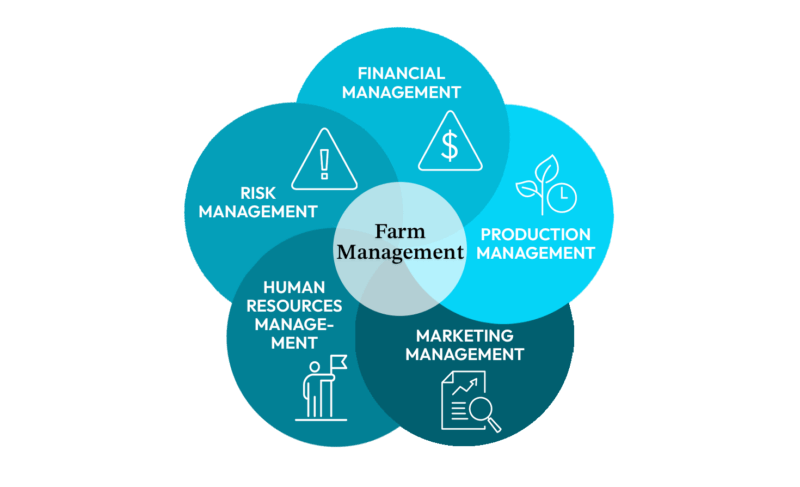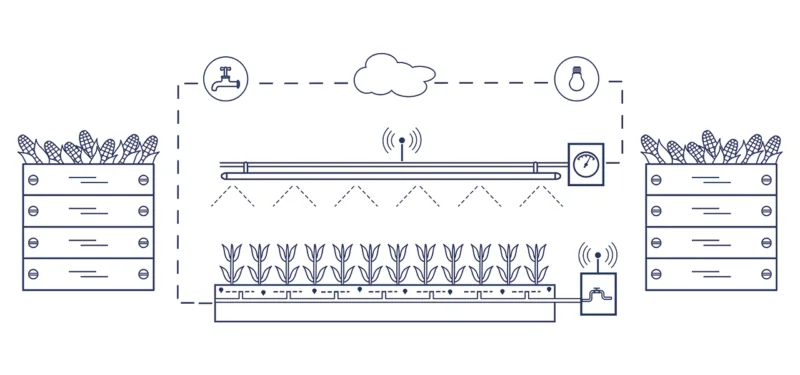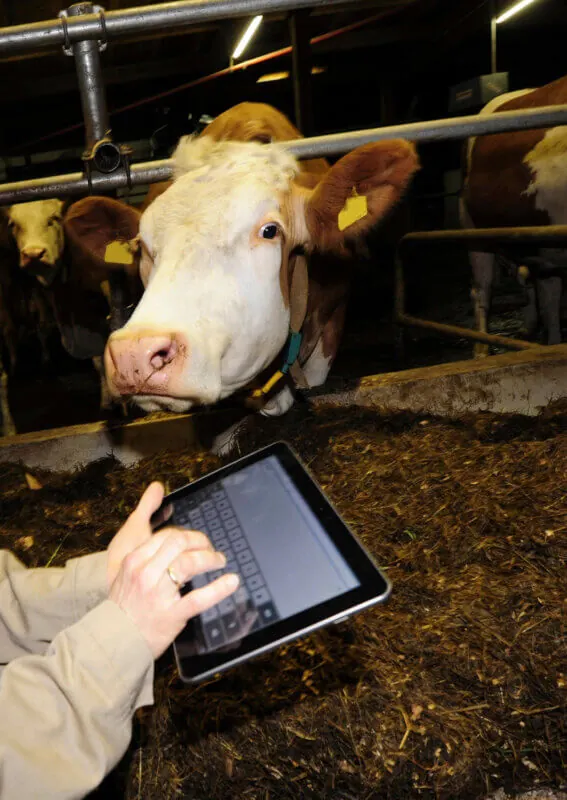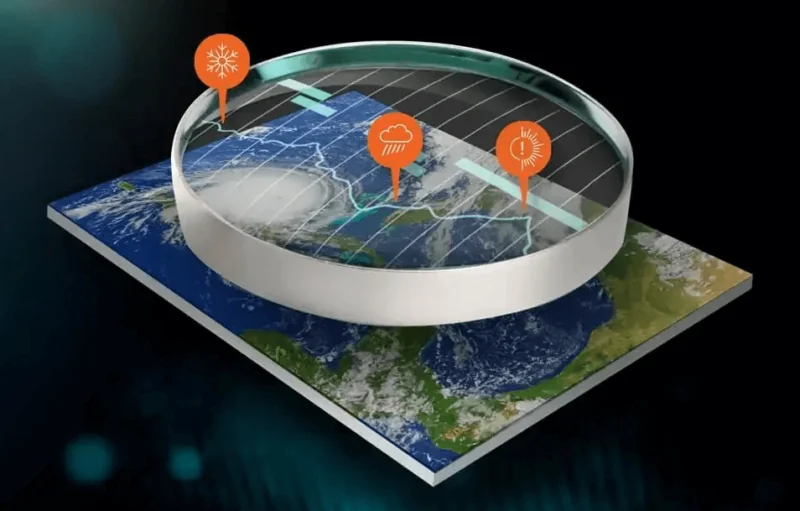New Product Launch: ClimateLens Monitor Yield Outlook - see regional and location-specific yields on key commodity crops, updated weekly. Learn More
Himanshu Gupta • September 26th, 2023.

The problems faced by farmers today are nowhere near similar to those of centuries past. Yes, droughts and floods have always been a risk, but never at such a level. Globalization and the innate interconnectedness of twenty-first-century business further raise the stakes for producers who are often at the mercy of fluctuating commodity prices and protectionist policies. Implementing a comprehensive farm management system is an easy, yet transformative way to mitigate many of the challenges currently faced by the agricultural sector.
Farming software helps farmers effectively manage their resources, track expenses and predict future trends in an ever-changing landscape.
Farm management is a broad term that refers to the making and implementation of the various decisions involved in operating a farm. It’s a fundamental practice not only for organizational purposes, but also achieving production and profit goals to remain competitive. A farm management system helps farmers keep track of their land and resources, monitor soil quality, optimize crop yields through informed decision-making, and develop plans for long-term sustainability. Although the concept has been around forever, farm management has been revolutionized by the growth of technology in recent years. The most efficient way to adopt it is through software.

Farm business management encompasses anything and everything that goes into keeping a farm operational and profitable. This includes:
Financial Management
Owners need to have tabs on their inflows and outflows of cash at all times. This is important not only from a budgeting perspective, but also in terms of financial planning and spend optimization. Access to timely data can help farmers make well-informed decisions about areas such as investments, borrowing, and allocating funds for various projects.
Production Management
Risk management in agriculture starts and ends with production. Crop selection and rotation, as well as livestock, irrigation and water management, all play a pivotal role in defining where a farm’s operational viability stands.
Marketing Management
Market research and analysis, sales channels, and marketing plans may not be the first thing to come to mind when you think of farming, but they’re unquestionably important when it comes to earning good income on a large and competitive scale in the industry.
Human Resource Management
No farm management system is complete without due consideration for one of the most valuable business assets of all — employees. Everything from their hiring and training to long-term safety and well-being must be prioritized in order to keep things running smoothly and efficiently.
Risk Management
Farm risk management covers a range of topics, from analyzing and identifying risks to insurance review and mitigation strategies. Often overlooked is the importance of investing in sustainable farming practices that reduce risk over the long term.
Agriculture management software is a computer program designed to automate business management, record keeping, and accounting for farms and other businesses in the agricultural sector. It can take on many forms, although most options available today fulfill at least the basic functions of tracking inventories, recording sales and purchases, generating financial reports, and managing labor costs.
Many agricultural management software solutions also incorporate more advanced features, such as decision-making assistance for crop rotation plans, tracking of fertilizers and pesticides used on crops, irrigation system control capabilities, soil analysis support tools to help optimize crop yield, and detailed weather forecasts.

Considering the demanding nature of agriculture itself, it’s reasonable to say that few farmers have the resources, time, or energy to check off each of the above-listed responsibilities on their own. Hence the need for farm management solutions like farming software. It’s an all-in-one tool for critical tasks like financial tracking, record-keeping, inventory management, crop planning, livestock management, demand planning and more, designed with the ultimate goal of simplifying farmers’ lives.
Crop management is a core pillar of agriculture management software that covers issues like crop production and monitoring, planting schedules and crop rotation, nutrient application, soil fertility, pest and disease control, crop yield, and operational performance. Good farm software goes beyond simple scheduling functionalities to allow farmers to conduct in-depth analyses of the soil, water, slope, and climate requirements for the products they grow while developing operational plans suited to those needs.

Farm management software consolidates all of the information owners need to keep their animals healthy and productive in one place. This includes things like health and vaccination schedules, breeding cycles, feeding, and nutrition plans. It’s also an asset for recording production data and looking back at historical data for comparison. Farm data management tools make parsing through years worth of information faster so that farmers can make informed decisions about their operations in less time.
Farm land management is no easy task. Done the old-fashioned way, it can involve hours, if not days of planning, not to mention time-consuming paperwork. Digital farm management systems get the job and everything it entails – from mapping and spatial analysis to monitoring, resource allocation, and irrigation – done with little to no paper in a fraction of the time. This allows farmers to work smarter and more efficiently, improving farm productivity and profitability.
Industry experts agree that Climate Smart Agriculture will be essential to weathering the increasing environmental uncertainties our world is set to face over the coming decades. Farm data management software can help in this regard by helping farmers strategically plan activities like planting, harvesting, and irrigation. By assessing weather-related risks as they evolve, farm management software enables landowners to make informed decisions and ensure their operations remain resilient in the face of climate change.
It goes without saying that pieces of farm machinery and equipment are the backbone to agricultural operations big and small. But as a complicated backbone, they need regular maintenance and care to deliver full value to owners. Farm planning software facilitates these two tasks and countless more to minimize equipment downtime while maximizing operational efficiency. Farm software is particularly helpful for farmers with large-scale operations that involve the use of multiple vehicle units and types.
Like every business, agriculture is not immune to the demands of financial management and accounting. Farm management software offers farmers a convenient way to monitor cash flow, store important documents, track their inventory levels, create invoices and handle other aspects of business finance. While not all farm management solutions include this functionality, those that do can pay dividends in terms of not only improved efficiency and better decision-making, but also actual cost savings.
As with any business investment, you should never settle for the first or cheapest farm management software product you find. The best farm management software can deliver just as much value, if not more, to your operations as a top-of-the-line tractor or combine.
That’s why so many farmers choose ClimateAi. A standout favorite within the industry, its advanced tools geared toward strategic planning and climate resilience are perfect for both small and large-scale farms. ClimateAi helps farmers track their crops, soil conditions, weather patterns, and more, in a way that’s easy to navigate and understand.

Those looking for software that hones in on farm data management alone may want to consider FarmLogs. This software platform gives farmers a comprehensive view of their field health and crop yields. It also allows users to track plant growth, compare data from different years, map out the boundaries of their fields, and set up automated notifications for things like pesticide application and irrigation scheduling. The drawback is that it doesn’t offer as many tools.
Offered by Trimble Agriculture, Trimble Ag Software is a land and farm management tool designed to simplify common tasks like crop planning and reporting. Users have the option of using the farming software alone or in combination with hardware placed on their land. Plans are tiered, meaning you’ll only get bare minimum functionalities with the basic membership. The added expense to upgrade could be a deal breaker for those looking for something cost-effective and robust.
A well-known name in the world of small farm management software, Granular is tailored to growers who want to make the most out of what they have. In-season crop stand evaluations, crop yield reports, and farm financials are a few of the main features included. Granular focuses on profitability through a focus on data-driven decisions. Its tools make crunching and comparing numbers much simpler, something that can be tedious and time consuming with multiple crops.
AgriWebb agriculture software is a platform for ranchers with herds of livestock. Its feed, medicine, and emission management features are quite comprehensive and can be tailored to suit various industry-specific needs, such as dairy, beef, sheep, and horticulture. AgriWebb provides data management tools for crops as well, although not as robust as those available for animals. This is a decent option to consider if you manage livestock exclusively, or almost exclusively.
Farmer’s Edge has the self-professed goal of enabling farmers to make more informed decisions with their land and resources. The company provides comprehensive solutions that work both on-farm and in the cloud with real-time data analytics. Its farm management software focuses on carbon offsetting, crop health monitoring, soil analysis and agronomic advice. This is great if you want to prioritize the planet in your farming, but limiting if that’s all you want to do.
Agworld offers a host of digital farm management services, supports, and tools through its package-based platform. Membership affords you access to a suite of features that cover the entire workflow of a farm, from budgeting and planning to job management and compliance. Agworld is big on establishing connections between growers and advisors through its farm software, as well as empowering landowners to make confident decisions about the future of their business operations.
Released in 2013, Agrivi is a cloud-based farm land management software. It offers powerful tools for managing your farm operations from anywhere in the world, removing the need for physical visits and paperwork. The platform can be adapted to meet needs beyond farmers’, such as those of food processing centers, cooperatives, input manufacturers, and banks. The challenge with such multifunctionality is that you tend to get less of a comprehensive approach to any single function.
Conservis is a cloud-based software solution for farmers, ranchers and agricultural cooperatives that delivers end-to-end data management capabilities. The system combines powerful analytics with intuitive user interfaces to help producers make better decisions. Intended for family and institutional operations alike, Conservis offers a reasonable degree of flexibility but comes short of the customization offered by competitors. It can still be a good entry-level choice for smaller operations and those looking for relatively easy-to-use farm data management software.
Digital farm management solutions abound, there are still some basic best practices that can do any landowner good when it comes to operational planning. This includes establishing clear goals and objectives within a realistic timeline. For example, if your goal is to increase crop yields by 10%, that sets a clear target and gives you something tangible to measure.
Make sure to align your goals in a single direction, rather than being scattered across multiple objectives.
Farm data management software can streamline data collection and storage from there, resulting in better decision-making and hopefully a higher chance of success.

A big part of successful farm risk management comes down to consistent evaluation. Everything needs to be monitored and adjusted as the season progresses. Develop systems to monitor weather, pests, labor needs, inventory levels and other conditions that could affect farm productivity. Some farm management services will do this for you, with the benefit being less manual work. But it’s also important to be able to interpret the data for yourself and maintain first-hand involvement. This is where having a proper software solution in place pays off most – by enabling timely decisions on a range of critical issues.
All good farm management systems incorporate some degree of communication into their practices. Without proper communication, vital information can get lost in the shuffle and opportunities for improvement may remain unseen.
That’s why it’s important for farm workers, stakeholders, suppliers and customers to have well-established channels for exchanging information, whether that’s through farm planning software or a connected supply chain platform. Technology-first approaches can be especially useful for facilitating effective communication between multiple parties, and for tracking important data such as field records, grain shipments or livestock movements. Teamwork and collaboration are also key to successful communication.
Anyone familiar with farm data management knows that no two years are ever the same. Things always change in the agricultural industry, and they’re only set to become more unpredictable in the face of climate change. That warrants educational and developmental investments from farmers young and old.
Continuous learning doesn’t necessarily mean full-time commitment; it can be as simple as attending workshops, networking with other farmers, or reading up on farm data management software, soil science and crop production. Even if you don’t have the time to attend a two-day seminar, there are plenty of online resources out there.
Agriculture management software will play a transformative role in farming as climatic changes continue to unfold around the world. But beyond the perspective of survival, it can also be a powerful tool to increase productivity and profitability.
Features like seasonal forecasting, data-driven decision making and analytics are becoming the norm for smart farms of today. By leveraging the power of modern technology, farmers can gain insight into their operations that would have been impossible before.